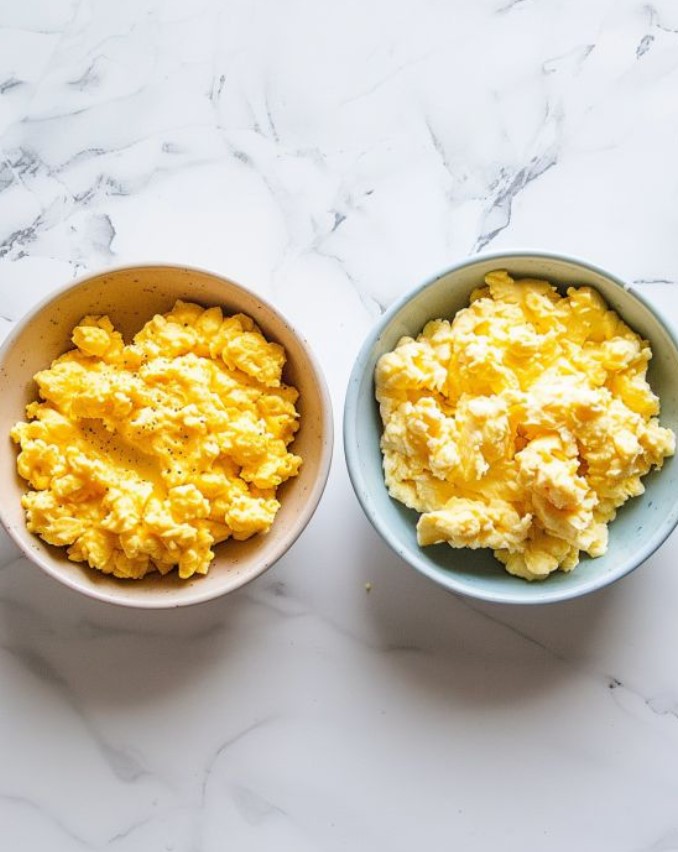The art of crafting the perfect scrambled eggs has fascinated both culinary experts and home cooks for generations. Despite its simplicity, the dish invites a myriad of techniques that can dramatically change its texture and flavor.
One of the most debated topics in the world of scrambled eggs is the addition of milk. My mother-in-law swears by this method, claiming it’s essential for creating creamy, fluffy eggs. Conversely, I argue that milk ruins the eggs’ natural taste. So, who’s right?
This seemingly trivial question dives deep into themes of culinary tradition, personal preference, and cooking techniques. This article will explore both sides of the argument, aiming to help you decide which approach resonates best with your taste and style in the kitchen. By the end, you’ll better understand how milk affects scrambled eggs and can determine your own preferences.
The Case for Adding Milk
1. Enhanced Texture
One of the strongest arguments in favor of adding milk is the resulting texture. When you incorporate milk into your scrambled eggs, you introduce extra moisture. This added liquid can create a softer curd, leading to a creamier and fluffier texture that many people enjoy. The richness of the eggs is accentuated, making for a delightful mouthfeel that can be particularly satisfying.
2. Balanced Flavor
Milk can also contribute to a more balanced flavor profile. For those who find eggs too rich on their own, the dairy can mellow the flavor, creating a subtler taste. Some even argue that the milk adds a hint of sweetness, enhancing the overall taste experience. This can make scrambled eggs more palatable, especially for those who might be less fond of the natural taste of eggs.
3. Increased Volume
When feeding a crowd, the practical aspect of adding milk cannot be ignored. By incorporating a splash of milk, you can effectively stretch your egg mixture, making it seem like you have more to serve. This is particularly useful when hosting brunches or gatherings, allowing you to cater to larger groups without doubling the amount of eggs.
The Case Against Adding Milk
1. Diluted Flavor
On the other hand, many purists argue that adding milk dilutes the rich, distinctive flavor of the eggs. Eggs have a unique taste that some believe should stand on its own without interference from dairy. By adding milk, you may lose the essence of what makes scrambled eggs so delightful.
2. Texture Concerns
While some insist that milk creates a creamier texture, others report that it can lead to a rubbery consistency, especially if overcooked. The additional liquid can complicate the cooking process, making it more challenging to achieve the perfectly cooked egg. For some cooks, this unpredictability can be a dealbreaker.
3. An Unnecessary Addition
Finally, there’s the argument that milk is simply an unnecessary addition. High-quality eggs are already rich and flavorful, and many believe they don’t need any extra ingredients to shine. By relying solely on the eggs’ natural properties, you can enjoy a dish that is both simple and satisfying.
Conclusion :
In conclusion, the decision to add milk to scrambled eggs is not merely a matter of taste; it reflects individual cooking philosophies and personal preferences. Cooking is an exploratory journey, and the kitchen serves as the perfect space to express your creativity. Whether you embrace the creaminess that milk offers or prefer the unadulterated flavor of high-quality eggs, both methods can yield delicious results.
It’s essential to remember that every cooking technique has its advocates and skeptics, and the beauty of cooking lies in its adaptability. Take the time to experiment with different methods and discover what resonates most with you. You might find that a dash of milk enhances your scrambled eggs one day, while the next, you prefer them without.
Ultimately, the goal is to enjoy your food and the cooking experience. So gather your ingredients, trust your instincts, and feel free to make scrambled eggs that are uniquely yours. As you explore, you may also inspire others to try new techniques in their culinary adventures.
After all, cooking is not just about following rules; it’s about enjoying the process and sharing your creations with those you love. So go ahead—whip up those scrambled eggs your way, and savor every bite!










